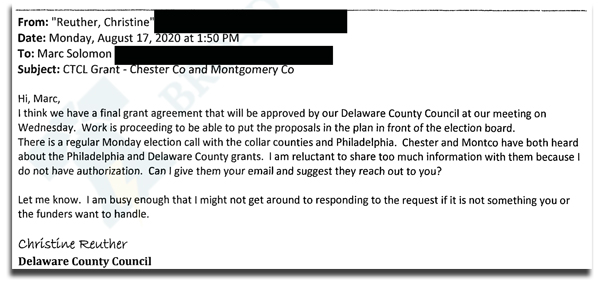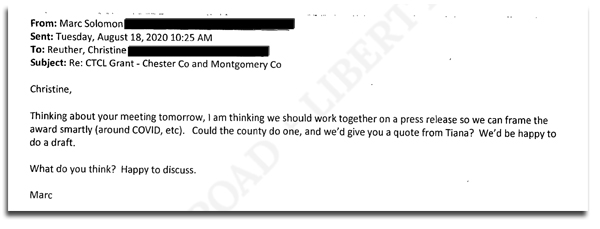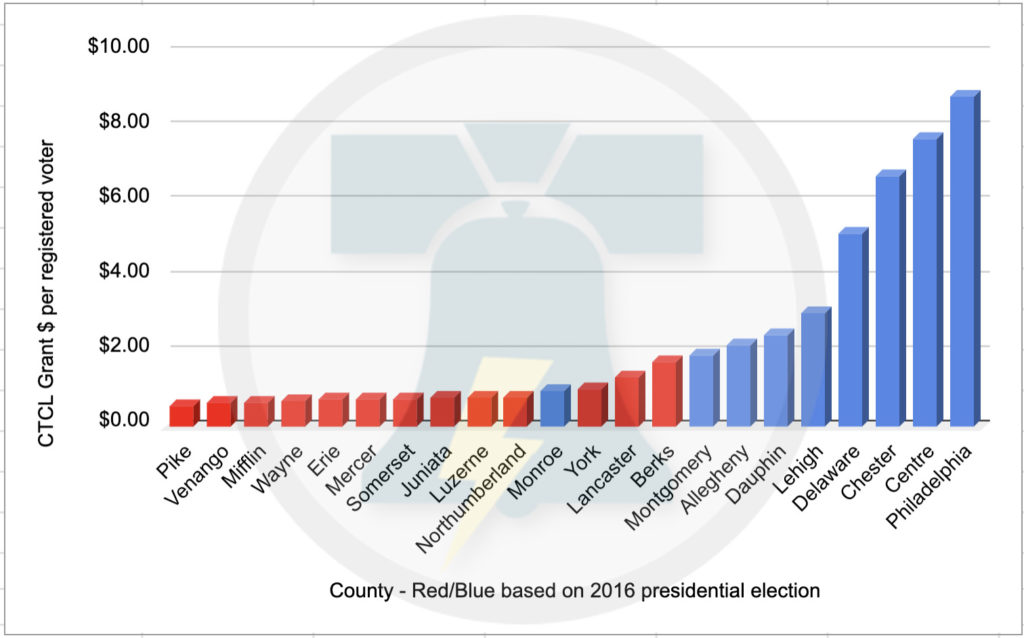Democratic-leaning counties selectively invited to apply for election grants, emails show
Emails obtained from the Delaware County Council add to mounting evidence that a network of left-wing nonprofits implemented a secretive process for awarding 2020 election grants that primarily benefited Democratic-leaning counties in Pennsylvania.
As Broad + Liberty previously reported, the total funding granted by the Center for Tech and Civic Life, a Chicago non-profit run by a former Obama Foundation fellow, was skewed heavily towards dense, Democratic-leaning counties like Allegheny, Philadelphia, Montgomery, Delaware, and Chester.
Despite this, both county officials and CTCL have maintained that the grant process was fair and non-partisan.
Emails from the county and the Pennsylvania Office of the Governor obtained via Right-to-Know request, however, raise doubts about that claim by showing that CTCL, through its partners, spent weeks only inviting counties that had voted Democratic in the 2016 election to apply for grants.
On Aug. 17, as Delaware County was about to put its CTCL grant agreement to a vote of the county council, Councilwoman Christine Reuther emailed Civitas Public Affairs consultant Marc Solomon indicating an invitation-only process.
“There is a regular Monday election call with the collar counties and Philadelphia,” Reuther began. “Chester and Montco have both heard about the Philadelphia and Delaware County grants. I am reluctant to share too much information with them because I do not have authorization. Can I give them your email and suggest they reach out to you? Let me know. I am busy enough that I might not get around to responding to the request if it is not something you or the funders want to handle,’ (emphasis added).

Delaware County was among the first counties in the commonwealth to be approached about the CTCL grant opportunity last year, according to all available evidence. Emails indicate that in the weeks before the grant opportunity was widely promulgated, the county worked primarily with Solomon.
Though Solomon used his email account associated with Civitas in communicating with the county, he said on more than one occasion he was working on behalf of a Civitas client, the Centers for Secure and Modern Elections (CSME).
CSME is a distinct entity from CTCL, the organization providing the grants. However, the two are cousins based on their organizational origins. Both are projects of the New Venture Fund. The New Venture Fund, in turn, is a subsidiary of the major left-wing philanthropic advisory firm Arabella Advisors.
Early in the grant process, on Aug. 6, Delaware County Solicitor Bill Martin sent an email to County Councilwoman Christine Reuther containing a link to background research on CTCL.
“Not at all surprising,” Reuther said in response. “I am seeking funds to fairly and safely administer the election so everyone legally registered to vote can do so and have their votes count. If a left leaning public charity wants to further my objective, I am good with it. I will deal with the blow back.”
“One of my principal objectives is to make sure every elderly Republican in the western part of the County can safely vote,” Reuther noted in another email to a Delaware County Election Board member.
However, CTCL and CSME had a more heavy hand in the process than merely being a charity to further Reuther’s stated goal of a fair and safe election.
As the apparent point of contact for this network to Delaware County, Solomon culled information from Reuther so as to be assured of the grant’s adoption by the county council.
“Any concerns about approval?” he asked on Aug. 17, two days before Delaware County would put its CTCL grant agreement to a vote by the county council.
“I do not foresee any problems other than a lengthy objection from the Republican member of the Board of Elections,” Reuther said, referring to Jim Byrne, who recently resigned from the elections board.
“Council has a copy of the grant and of the agreement and each member has individually expressed support,” Reuther continued. “The Election Board also has the grant application. I have spoken individually to the two Democrats on the Board and each of them expressed their personal support for the grant proposal items. They may ask that the Election Staff proceed with the pop up voting sites but report back for final approval at a meeting in early September when they have sign off from the Sec of State on the SURE connection.”
One day before the grant application would be approved by the council, Solomon wrote Reuther in a one-to-one email about preparing a public announcement (emphasis added):
“Thinking about your meeting tomorrow, I am thinking we should work together on a press release so we can frame the award smartly (around COVlD, etc).”

More emails indicate that Solomon and the communications director for the CSME continued to lean on the county in regards to outward communications.
“As promised, here’s a draft [press] release that we propose Delaware County put out, along with suggested talking points,” Solomon wrote on Aug. 19. “Can we please get on the phone to discuss sometime this afternoon?”
Reuther said the CTCL-drafted press release was not used.
Nevertheless, the final press release twice characterized CTCL as “nonpartisan,” despite Reuther’s prior admission that the organization is “left leaning.”
Reuther also says there was nothing improper about her email regarding bringing Chester and Montgomery into the loop.
“I am confused by your repeated return to questions about sharing information with other counties,” Reuther told Broad + Liberty in an email. “I serve the people of Delaware County and while I hope other counties do a good job serving their residents, I can not be responsible for their work. The supposed reluctance to share information you reference was due to the fact the grant had not been approved yet — a fact made clear in the sentences preceding the statement you highlighted.”
Solomon did reach out to more counties, but apparently only to Philadelphia’s collar counties, which all voted Democratic in the 2016 presidential election. “We’ve invited Chester, Montco and Bucks to apply! They’re on it,” Solomon wrote to Reuther, also on Aug. 17.
When Montgomery County completed its application, Solomon noted it to CTCL executives.
“What think you, Sam and Tiana,” Solomon asked the CTCL’s chief counsel, Sam Oliker-Friedland, and CTCL executive director Tiana Epps-Johnson.
“It’s an application for $1.2 million — third-largest county in the state. Philly suburbs! Shall we turn it into more of a plan, or could this suffice?”
On the same day that Solomon said the three other counties would be invited, Jessica Walls-Lavelle, then a staffer in Gov. Wolf’s office, began coordinating a grant request for Chester County.
Emails show she acted as a go-between, informing Chester County of the process to apply for CTCL grants, similar to Solomon. She also kept Solomon informed of her efforts, forwarding information about the county’s progress to him.

In one email, Solomon described the CSME’s goals with the grants as intended to aid “counties with a large population, with deep need, and with a large number of historically underrepresented individuals.”
However, based on the results of Right to Know requests, neighboring counties like Lancaster, York, and Berks, which are nearly interchangeable with Chester in terms of density and minority population, received no email from the governor’s office, the department of state, or other counties informing them about the opportunity in August.
That changed on Sept. 1, however, when Facebook founder Mark Zuckerberg and his wife, Priscilla Chan, announced a gift of $250 million to CTCL. After this donation happened, all counties across the country were invited to apply.
Emails from the Department of State show that Walls-Lavelle and another consultant from a not-for-profit called The Voter Project, Gwen Camp, nonetheless continued to groom the applications for specific counties after Sept. 1. They focused on Lehigh, Centre, and Lackawanna Counties—all of which voted Democratic in the 2016 presidential election.
After numerous Right to Know requests have been completed with both the governor’s office and the department of state, no emails from Walls-Lavelle ever show her working to facilitate a grant to any of the slightly more than a dozen “red” counties that eventually received CTCL grants.

Councilwoman Reuther and the county have never answered direct questions as to whether they had any indication that CTCL and CSME were only targeting Democratic-leaning counties prior to Sept. 1, or that they provided special assistance to those counties after Sept. 1.
“CTCL funds were used equitably throughout the County (e.g. one drop box for each municipality) and the objective of the County was to facilitate a range of voting options, during the height of the pandemic, for all registered voters in the County, without regard to party registration or affiliation,” county spokeswoman Adrienne Marofsky told Broad + Liberty in June. “In multiple lawsuits brought by partisan interests, there was never any evidence presented that the County election administration attempted to benefit one party over another.”
Republicans have not argued that the grants were used unfairly within the confines of a single county.
“I don’t think anybody would disagree that Philly would get substantially more money than some of these counties,” said State Rep. Seth Grove (R-York County) earlier this year about the grant disparities. “But proportionally, it appears to look as though some red counties were patted on the head and said, ‘Oh, here you go’ to say that money went to red and blue counties combined.”
The conservative leaning Foundation for Government Accountability has done its own research on the CTCL grants in the swing states of Arizona, Wisconsin, and Georgia.
“These grants were not about COVID-19 – they were about influencing the outcome of elections,” said Nick Stehle, vice president of communications for FGA.
“It is further evidence as to why we can’t have corporations and political organizations involved in the funding of our elections, and shines a light on the undue influence being given to these powerful special interest groups. Pennsylvania voters should be free to decide the outcome of their own elections without outside influences trying to tilt the scale in favor of one political party over another.”
Gwen Camp, Jessica Walls-Lavelle, New Venture Fund, CTCL, and CSME all did not respond to requests for comment.
Todd Shepherd is Broad + Liberty’s chief investigative reporter. Send him tips at tshepherd at broadandliberty.com, or use his encrypted email at shepherdreports at protonmail.com.





Denser urban areas are harder to administrate elections, are more stretched for resources, and are more likely to vote D. Despite the right’s hysterics over how they’re always the victims, this is a nothingburger. Are we supposed to follow the lead of red states like Texas where there’s one ballot drop box for a rural red leaning county with ~200 residents and also one single drop box in a D leaning county with over a million? According to the logic of this article that would be “fair”.
The fact that it was privately acknowledged that the grants were from a left-wing organization targeting Dem heavy counties, then publicly portrayed as nonpartisan, puts the lie to all the claims that this was NOT designed to tilt things towards the dems.
“CTCL funds were used equitably throughout the County (e.g. one drop box for each municipality) …. ”
So, by your logic, we have to assume that each municipality covers the same area and has the same population? Because, in objective fact, we know that’s not an accurate statement. Simply compare Chester and Trainer, right next door. But, we also know that objective fact is a racist concept, only believed by Republicans.
I’m not Republican but I believe in objective facts. Here’s my favorite one: Trump lost (by a lot!)
Will, according to the graph above, most red leaning counties were awarded minimal moneys PER VOTER. It appear that 11 of the 13 red counties received less than $1.00 per voter, the other two were still less than $2.00 per voter) While obviously, Philly is larger and would be expected to get more dollars based on that, the graph indicated not only more raw dollars, but far more money per voter (around $9.00). Therefore, in the Texas rural vs a D leaning with five times as many voters, you could do 5x as much work without impacting the spend per voter.
You’re assuming that the cost of administering an election scales linearly to the number of voters. I could see many ways in which administering an election to a hundred thousand voters is more than a hundred times as expensive as administering to a thousand voters. I’m curious to know what your assumption is based on.
I think you need to reread the article and use some critical thinking skills:
CSME is a *distinct* entity from CTCL, the organization providing the grants. However, the two are “cousins” (my emphasis).
Not only is it possible for a partisan group to issue nonpartisan grants but it’s certainly possible for the “cousin” of a partisan group to do so. So no, I don’t see how the nonpartisan nature of these grants has been “put to lie”.
Makes me sick how these scum just blatantly continue to ignore the facts in front of them. No accountability and will always try to steer away from the truth. They will use trump as a change the question fast way far left coward uhhhhhh